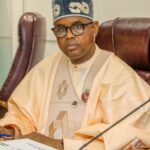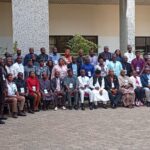By Chiazo Ogbolu
President Muhammadu Buhari has urged African countries to expand and diversify their participation in international trade to explore the benefits of the African Continental Free Trade Agreement (AfCFTA).
Buhari made the call at the ninth African Shippers’ Day with the theme: “African Continental Free Trade Agreement: A Veritable Platform for African Shippers’ to Mainstream into Global Trade,” on Monday in Lagos.
Buhari said that the participation of African countries in international trade would create wealth, generate employment and reduce poverty.
He noted that the volume of African export in the global trade was still very low at three per cent in spite of the growth in the continent.
Buhari was represented at the event by the Minister of State for Transportation, Mr Ademola Adegoroye.
He noted that deepening regional integration to scale up supply capacity and build regional value chain was essential to the continent’s economic transformation.
“For AfCFTA to have a positive influence on long-term investment in productive capacities, African government must develop appropriate supporting policies, build the requisite infrastructure and ensure an educated work force.
“We will need to actively promote productive employment and decent work place, women’s empowerment, food security and reduction in inequalities,” he said.
Buhari, however, said in Nigeria, AfCFTA would be a game-changer when it comes to stimulating intra-African trade because the more ambitious the trade liberalisation, the greater the expansion of Nigerian exports to its African partners.
“Specifically, Nigeria’s exports to the rest of African will increase by more than 15 per cent in fishery, textile, leather, wood and papers, metals, electronics, vehicles and transport equipment and machinery.
“Following the AfCFTA reform, Nigeria’s exports will increase significantly to other African sub-regions, outside West Africa, with most impressive expansions to countries such as Botswana, Cameroon, Egypt, Ethiopia, Kenya, Malawi, Morocco, Mozambique, Namibia, Rwanda, Tanzania, Uganda and Zimbabwe,” Buhari added.
He said making AfCFTA a reality would require creating national institutions for implementation of the agreement.
The president also stressed that the need for collaboration between the public and private sectors as well as donor agencies.
“That is why the Nigerian government have intensified efforts aimed at identifying new opportunities for diversification and value chain development under the AfCFTA, and complementary actions considered necessary to overcome the existing constraints to intra African trade.
“This, we will, achieve through cross sectoral approach, considering not just trade, but also closely related areas such as agriculture, industry, macroeconomic management and infrastructure development,” he said.
He noted that for AfCFTA to be the platform that would propel African importers and exporters onto the global trading platform, participating member countries must undertake bold domestic structural reforms to scale up the supply capacity of the region.
In his contribution, Dr Bashir Jamoh, the Director-General, Nigerian Maritime Administration and Safety Agency (NIMASA), urged the forum to come up with roadmap that would place Africa ahead of others in the international market.
Jamoh noted that collaboration between shipping, port and logistics would go a long way in ensuring efficiency and sustainability in the industry.
On his part, Mohammed Bello-Koko, the Managing Director of the Nigerian Ports Authority (NPA), said that automation remained vital tool for port efficiency.
Bello-Koko said that was why the NPA was working with the International Maritime Organisation to deploy Port Community System in Nigerian Ports to bring all stakeholders under one platform for ease of doing business.
Earlier, Mr Emmanuel Jime, the Executive Secretary, Nigerian Shippers’ Council, said the re-orientation and re-organisation of intra-African trade should start from the sub-region.
According to him, when the region gets it right in West and Central Africa, it will be much easier to connect and freely trade with other regions of the continent.
Jime noted that African countries need to create smooth integration of their transport networks and trade policies as well as the required awareness among the economic operators in the sub-region. (NAN)(www.nannews.ng)











